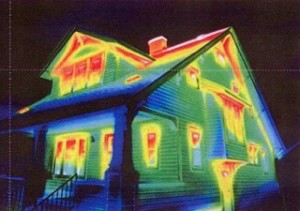From Guest Blogger Emma Sturgis: Three Unexpected Insulation Options That Will Help Your Home Be More Energy Efficient

Trees And Shrubs
Heat gain is one major problem that arises from having poor or inadequate insulation. The sun’s rays can greatly increase your home’s interior temperature in a short time, which means that your air conditioner will be forced to run more often to keep the home cool. Although high-quality windows and properly insulated walls and attic are the biggest helps in preventing heat gain, you might also want to consider planting shrubs or shade trees along the west side of the building. The vegetation will help to block out much of the sun during the summer to lessen the heat gain. However, the bare branches will let the sun through during the winter when heat gain is actually a benefit. Although this method won’t have as much of an effect if your home is well insulated, it can be a great help for older or poorly insulated properties.
Windows
Windows are one of the biggest sources of heat gain and also air leaks. This means that replacing your older windows with new Energy Star-rated windows is one of the easiest and most effective ways for boosting your home’s energy efficiency. This is especially true for any building that is still outfitted with old single-pane windows. Newer double- and triple-pane windows are much better at preventing heat loss and gain, which can help you to drastically cut down on wasted energy. Of course, it is essential that you hire a company to have the windows installed, like the professionals at Royal Exteriors LLC. Otherwise, you risk negating all of the benefits of your new energy-efficient windows if they’re not installed properly and well-sealed.
Caulking And Weather-stripping
The weather stripping around your windows and doors does much more than you’d imagine at preventing air from entering and escaping the home. This means you’ll want to regularly check to make sure that all of your weather stripping is still in good condition. If it is beginning to crack or become brittle, replacing it is a quick way to eliminate air leaks. Similarly, any gaps in the caulking around your windows and doors also cause air leaks.
Unfortunately, caulking and weather stripping weathers and degrades over time. Even if you had new high-efficiency windows installed a few years ago, you’ll still want to make sure that the weather stripping and caulking is in good condition. Alternatively, if you currently can’t afford new windows, replacing the weather stripping and re-caulking is a good way to improve efficiency until you do have the funds to buy new windows.
The fact that energy prices continue to rise means that energy efficiency is something that every homeowner should take seriously. Just because you live in an older home doesn’t mean you should have to pay an arm and a leg for utilities, but it does generally mean you’ll have to work to ensure that this isn’t so. Still, by making a few simple changes to improve your home’s insulation, you should be able to prevent energy waste and thus lower your bills.

In fact, many small things can make a great difference. We all know that saving energy is important, but there are still many people do not know that we can do a lot of things to save energy in our daily life. Thank you for sharing this with us.
Thanks for your sharing. If we can make a few simple changes to improve our home’s insulation, so we will prevent energy waste.